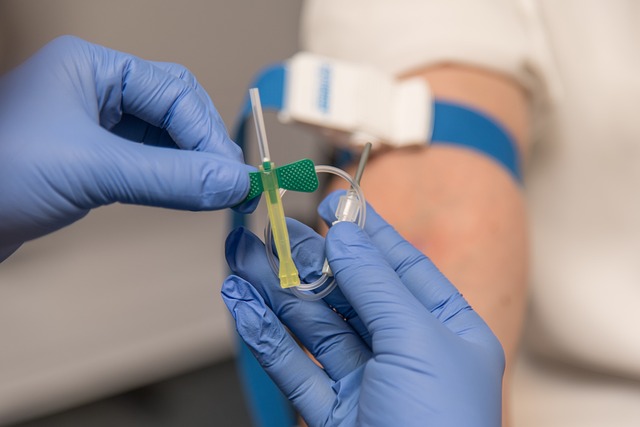Vitamin B12 deficiency, a common but missed health issue in the UK, poses risks to overall well-being. Recognizing symptoms like fatigue, weakness, memory issues or nerve damage is crucial for timely diagnosis alongside risk factors such as age, diet (particularly for vegans/vegetarians) and autoimmune disorders. UK General Health Blood Tests measure homocysteine, folate, and serum B12 levels to identify deficiency, enabling early treatment to prevent long-term complications like neurological and cognitive impairments. Preparation includes fasting 8-12 hours before the test, wearing comfortable clothing, informing healthcare providers about medications, and ensuring B12 levels are assessed during the comprehensive blood screening.
In the UK, vitamin B12 deficiency is a growing concern. Proper diagnosis through comprehensive testing is crucial for effective treatment and management. This article explores the symptoms and risk factors associated with vitamin B12 deficiency, highlighting the critical role of blood tests in confirming its presence. We delve into the UK General Health Blood Test, providing insights on what to expect and how to prepare, ensuring a smooth process towards optimal health.
- Understanding Vitamin B12 Deficiency: Symptoms and Risk Factors
- The Role of Blood Tests in Diagnosing Deficiency
- UK General Health Blood Test: What to Expect and Prepare For
Understanding Vitamin B12 Deficiency: Symptoms and Risk Factors
Vitamin B12 deficiency is a common yet often overlooked health issue in the UK, with potential risks to overall well-being. Recognising the symptoms and understanding the risk factors are key steps towards prompt diagnosis and effective treatment. Some individuals may experience subtle signs, such as fatigue, weakness, and memory issues, while others can present with more severe symptoms like nerve damage and anaemia.
Several factors contribute to the development of this deficiency, including age, dietary intake, and underlying medical conditions. Vegans and vegetarians are at a higher risk due to the primary source of B12 being animal-based foods. Additionally, individuals with certain autoimmune disorders or those who have had their intestine or stomach removed may also be vulnerable. Regular UK General Health Blood Tests can play a vital role in identifying this deficiency early on, enabling timely interventions and preventing potential long-term complications.
The Role of Blood Tests in Diagnosing Deficiency
Blood tests play a crucial role in diagnosing vitamin B12 deficiency, offering a reliable method to assess an individual’s nutritional status. In the UK, general health blood tests are commonly used to detect levels of homocysteine and folate, both of which are indicators of B12 status. Elevated homocysteine levels suggest a potential deficiency, as B12 is essential for the proper metabolism of this amino acid. Furthermore, these tests can measure serum vitamin B12 concentrations, providing direct evidence of the body’s nutritional state.
By comparing results against established reference ranges, healthcare professionals can accurately diagnose deficiency or insufficiency. This early detection is vital as untreated B12 deficiency can lead to severe neurological and cognitive impairments. Therefore, a simple blood test is often the first step in ensuring prompt diagnosis and appropriate treatment, such as dietary changes or injections, to prevent further complications.
UK General Health Blood Test: What to Expect and Prepare For
When considering a UK General Health Blood Test, it’s important to be prepared both mentally and physically. This comprehensive screening is designed to assess various aspects of your overall health by analysing a small sample of your blood. During the test, healthcare professionals will typically check for levels of essential vitamins and minerals, including vitamin B12.
To prepare, ensure you fast for at least 8–12 hours before the appointment. This means abstaining from food but staying hydrated. Wearing comfortable clothing is also advisable as it facilitates easy access to veins for blood extraction. Remember to inform your healthcare provider about any medications or supplements you’re taking, as these might impact test results.
Vitamin B12 deficiency can often go unnoticed, but recognizing its symptoms and risk factors is key to early intervention. Blood tests play a vital role in diagnosing this deficiency, especially with the comprehensive UK General Health Blood Test. By understanding what to expect during this test and preparing accordingly, individuals can take proactive steps towards maintaining optimal health. Remember, prompt identification of B12 deficiency through such tests can prevent more severe complications, ensuring better overall well-being.
